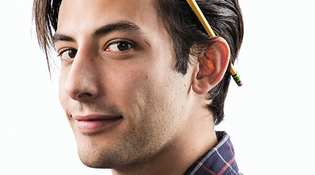 loading
loading
featuresMy lunch with CalebYou think solving a crossword puzzle is hard? Try making one. Alex Beam ’75 is a columnist for the Boston Globe. When not beating his head against the Saturday crossword, he is finishing a book about the architect Mies van der Rohe.  Max GerberView full imageMy lunch with Caleb Madison ’15 turned out to be an extended, unintentionally hilarious affair. We met at The Pool, once better known as the Four Seasons, on the ground floor of Park Avenue’s Seagram Building in Manhattan. The restaurant was deserted. The staff insisted it was an aberration. So Madison and I whiled away two hours with servers hovering around us like honeybees. We weren’t very hungry, so we’d ordered on the cheap: salads and no alcohol. No surprise, then, that at the 90-minute mark, our buzzing attendants were asking: Would you like to see the dessert menu (again)? Here is the check (again). Whenever you are ready. But we lingered. Madison is great company. He is alert, handsome, funny, clever and he eats like a bird. (A very slow bird.) We were having fun. At least, I was having fun, and Caleb put up a noble front. A comedy veteran at the tender age of 25, he cracked wise beyond his years. Asked where he was living, he quickly replied, “In Fort Greene, Brooklyn, along with every other millennial who ever lived.” Among his many accomplishments, Caleb is a young prince of Crossworld, the loosely defined planet of crossword solvers and constructors who bedevil and beguile tens of thousands of Americans every day in newspapers and on websites. Some constructors have become household names; for instance, New York Times puzzle editor Will Shortz and the late, legendary Merl Reagle were featured on a 2008 Simpsons episode. Shortz reigns as the unofficial Grand Vizier of Crossworld, and he is a huge Caleb Madison fan. “I met Caleb at the American Crossword Puzzle Tournament in March 2008,” Shortz recalls, “when he came up and asked if he could intern with me during the coming summer. I asked him what year he was in school. He said, ‘freshman.’ I assumed he was a freshman in college, but it turned out he was in high school. Caleb’s specialty was pop culture, especially movies, about which he knew more at age 15 than I know today—and I watch a lot of movies!” Caleb’s internships with Shortz and Ben Tausig (creator of the American Values Club crossword) and friendship with crossword entrepreneur Brendan Emmett Quigley helped launch his precocious career. Before he arrived at Yale in the fall of 2011, Caleb had published ten puzzles in the New York Times. To date, he has published 33 crosswords there—24 dailies and nine Sundays—making him one of the paper’s more prolific contributors. “I thought I was young when I sold my first puzzle to the Times at 21,” Quigley says. “That’s positively ancient compared to Caleb’s 15. Yikes. That’s young. I mean, suddenly, I feel old. Whoa.”
I was surprised to learn from Madison that he’s a slow puzzle solver. “I like to enjoy a puzzle—that’s why I don’t do tournaments,” he explained. “The very best crossword is like a story that you discover while solving it. You should receive the same satisfaction as from reading a work of art.” One of his puzzles, “Spirituals,” which appeared two days before Halloween 2014, is just such a work of art, worthy of a place in the yet-to-be-created Crossword Hall of Fame. The puzzle is “haunted” by . . . well, no spoilers here. Not surprisingly, Madison has very strong opinions about puzzles. “I hate it when crosswords become a cipher for ‘How smart am I?’ or when it’s a test to see if you can join a cool group. It’s awful when people feel too stupid to play—‘Do you know this germ?’ ‘Do you know this island?’” He disdains British-style cryptic puzzles (“made for people to not understand”), as well as acrostics, a fill-in-the-blank puzzle miscegenation that remains very popular in the Times and the Wall Street Journal. Even with the help of the software program Crossfire, it sometimes takes Madison 40 hours over the course of a year to create a Times-sized fifteen-by-fifteen grid. (But not always. Sometimes he completes three or four in one night.) He has assembled only one crossword—his first ever—by hand. “It was awful,” he recalls. The smaller-format six-by-six or nine-by-nine puzzles he now constructs each weekday for the Atlantic website can take from 2 to 24 hours. For us, it’s pleasure; for him, it’s work. Happily for Caleb, America is experiencing something of a crossword craze. He has built crossword puzzles for both BuzzFeed and Vice. The New Yorker started publishing a crossword puzzle a few months after we met, and the Atlantic quickly followed suit. For the past several years, the Times has been mentioning the success of its puzzle subscriptions in its quarterly financial reports. Madison and his constructor cohort may have lucked into a Golden Age of Crosswords. Many of these new puzzles are crafted by funnier, hipper constructors, among whom Caleb might be, well, 1 Across—the first among relative equals. American Values Club editor Tausig hails Madison’s “cluing brio,” adding, “Even at age 16 or 17, he was making a splash doing a lot of fresh stuff, fresh content, injecting it with a new energy and coming up with brilliant themes all the time. He was also this incredibly nice person.” There are dozens of examples of Madison’s creativity strewn around the Crossworld landscape. He is, after all, the man who sneaked the phrase “Go commando” into the Gray Lady’s venerable grid in the summer of 2018. (The clue: “Leave one’s drawers in the drawer, say.”) One of my favorite Caleb clues is “Like Captain Phillips or Argo, according to me.” Answer: “Meh.”
 Max GerberView full imageOver lunch we connected the dots that had brought Madison to Yale. The son of a television producer and a casting director, he attended the Center School, founded by his grandmother, on New York City’s Upper West Side. From there he went to Bard High School Early College in lower Manhattan, which he called “Hipster High, with a huge emphasis on academics. The gym was the cafeteria.” His first glimpse of Yale was the inside of Linsly-Chittenden Hall; he and Shortz had arranged a college crossword tour there. While it is true that there are not-quite-ready-for-prime-time Caleb Madison moments on the Internet, there are some star turns, too. One terrific digital artifact is Caleb’s American studies senior thesis, an extended parody video for which he set up a fake-promotional website. The site urges you to “follow five college students as they journey to bring their groundbreaking new musical Our Modern Lives to Broadway!” Lives also has its own Facebook page and Twitter feed. Like many a clued-out grownup, I originally thought the site was a for-real effort by a group of Yalies trying to land their play on Broadway. In reality, it’s a hilarious gag. Lives was the rare senior thesis to be reviewed by the Yale Daily News, which raved: “In addition to being smartly written, well produced, and full of things to say about contemporary America and the human condition, Our Modern Lives is seriously funny.” The video features a student producer who wanders through the filming in a narcissistic trance (“I’m a hard worker, and I work hard on how I look”); a spoiled starlet who’s a vintage-store clotheshorse; and a Southern Californian, acting president of Alpha Delta, the “chill frat on campus.” Asked about his life philosophy, which involves smoking a fair amount of no-longer-very-controlled substances, the frat president responds: “I don’t have a life philosophy—but that is my life philosophy.” Yale School of Art photography critic Benjamin Donaldson played a side-splitting cameo as Godfrey L. Simmons Jr., an eccentric, pompous drama teacher at St. Insular School for the Performing Arts. “Caleb told me to be part John Houseman in The Paper Chase, and a bit of the Ignatowski character from Taxi,” he says. Madison never appears in the videos, but Donaldson remembers him hovering behind every scene, frantically rewriting script lines on set à la Stanley Kubrick. “Caleb was very hilarious,” Donaldson says. “The thing I like so much about Caleb is that he has so many compartments in his life that all add up to something unique and interesting.” Since I first dined with Caleb, he has gone on to do other unique and interesting things. While living in Brooklyn, he worked on a documentary film about his aunt, the Upper East Side housewife/comedienne Felicia Madison. She has been called “the real-life, modern Mrs. Maisel” (in tribute to the Amazon series The Marvelous Mrs. Maisel). Some of that footage earned Caleb a place at the University of Southern California School of Cinematic Arts, where he recently completed his first semester. The completed 80-minute documentary, Funny Lady Felicia, coproduced with Simon Penzer ’14 and Joe Kuperschmidt ’17, has been submitted to several festivals. How is the longtime New Yorker adjusting to L.A.? “I love it so far,” Madison says. “L.A. gets a lot of crap because it’s easy to live in, but I find that character-building. You can relax and write and get on with your life. I’m a homebody, and in L.A. there’s never any pressure to leave your apartment.” Caleb is the rare ambulatory Angeleno. Living in Jefferson Park, just west of USC, he doesn’t own a car. “I take the L.A. Metro most places,” he says. “It’s beautiful, and it’s really clean because no one uses it.” Yes, crosswords are paying the rent, at least some of it. Madison still constructs the Atlantic’s daily puzzle, which starts small on Monday and grows larger and more difficult by Friday. I reminded him over the phone that when we met for lunch he was proselytizing for the smartphone-solvable mini-crosswords (“I’m on the mini train”) that have been popularized by the New York Times. Now, at the ripe old age of 26, he recommends solving puzzles on a computer, not a phone. “I hate the goddamn iPhone,” he admits. “I hate squinting. Oh my God—do I sound like an old person?” To be fair: not quite yet.
The comment period has expired.
|
|